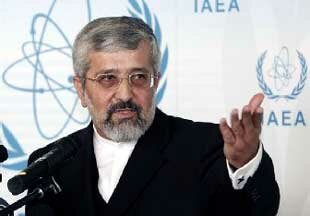Followings are excerpts from an interview conducted by Washington Post with Iran's Ambassador at the International Atomic Energy Agency, Ali Asghar Soltanieh.
On Iran's proposal for talks:
"We have given a package now as a basis of negotiation, and it is very clear. We said this package has a wide scope, including all global, regional elements that could be discussed. When you sit down at a negotiating table without preconditions, with mutual respect, the rules of the game are that everyone has a right to raise anything. No one can restrict the other to express themselves."
"The main aim of this package is so, at the end of the day, this group of countries would promote cooperation for solving problems and challenges of the world. . . . If they have the political will, and goodwill, if they will go beyond simply reading the text and read between the lines, they can understand that the whole thing is being done with good intentions. This is the best course of action, and this is a real, new window of opportunity that is being opened by the Iranian nation. And they should immediately and promptly seize this opportunity."
On Iran's right to nuclear power:
"We have not seen any justification for suspension, legally or politically. This is contrary to our inalienable rights. . . . We cannot accept that, because of political motivations, they [Western powers] go to New York and want to dictate to us. We will pay any price, but we will not accept being dictated [to]. We had a revolution to remove a dictator."
"We of course are not going to negotiate away our right to nuclear energy -- no one should negotiate away these principles, which are enshrined in the statutes, the IAEA and the Nonproliferation Treaty. . . . Any issues of nuclear matters -- verification, nonproliferation, security, disarmament, in the whole world, can be discussed in the negotiations. And if there are particular questions as to verification mechanisms, to verify, to clarify, the agency [IAEA] is responsible and it will be passed to the agency to do its job."
On previous U.S. and Western "miscalculations" about Iran:
"We expect the Western countries to study more carefully and more in-depth our Iranian culture. If you know more about Iranian culture you would be able to deal with us in a more pragmatic, logical and realistic way, and you would not make so many miscalculations. The problem with the West is, they look at countries from their own angle. They have to come down. They have to see other countries and respect their viewpoint and learn more about what are the sensitivities of these people.
"If you use the policy of the carrot and stick, if you use the dual track of sanctions and dialogue, this is counterproductive -- this is humiliation, if you really know Iranian culture. If you tell me 'You must,' I say 'no.' If you say 'please,' the answer might be 'yes' or 'maybe.' "
On sanctions and stalemate:
"We will not, of course, be able to tolerate any sort of pressure or intimidation or language of threats. This is out. They should not use this language of threats any more.
"The reason we have not been able to have negotiations in the past is because of this mistake and miscalculation: They insisted on preconditions, and thought we would accept it. We would never accept it. Preconditions is an indication that you in fact are dictating the conclusions of the negotiations in advance. . . . Negotiations are give-and-take. They [the West] will be satisfied at the end of the day. Not fully satisfied, but each side of the negotiations should achieve something.
"By imposing sanctions they though we would give up enrichment, but it was another miscalculation. Not only did we not give up, but we increased our efforts and made more and more achievements. We passed all these barriers, one by one."
On the Obama administration:
"If this administration translates their slogans -- particularly those during the elections -- into real actions, then they will see that this 'change' will lead to change. With this package and this new event, it is possible that new negotiations will hopefully emerge. . . . We really want to see if those slogans for change are genuine and honest, and if they fundamentally change American foreign policy, or are just an artificial change."
Iran's view of nuclear weapons:
"Our religious school of thought forbids all weapons of mass destruction. But let's suppose that Iran would go for nuclear weapons. How many warheads do you think Iran would have? In a couple of years, let's say one or two. If we were to get a nuclear weapon we would be at a disadvantage, competing with the United States, which has thousands of warheads. It would be a tactical mistake for our country to do that, and our leaders are clever enough not to do it, apart from the religious obligations and all other things."
Iran as a potentially ally with the United States against terrorism:
"I feel terribly sorry that some in the name of Islam have distorted the religion. We are totally against any of these terrorist groups or extremist groups. They are the true enemies of my belief . . . . What is happening in different parts of the word with these so-called Taliban -- this kind of extremist thought is not in accordance with Islam and we cannot accept them."
Source: Washington Post
September 18, 2009
MSN - - - Wikipedia - Hamsayeh.Net



